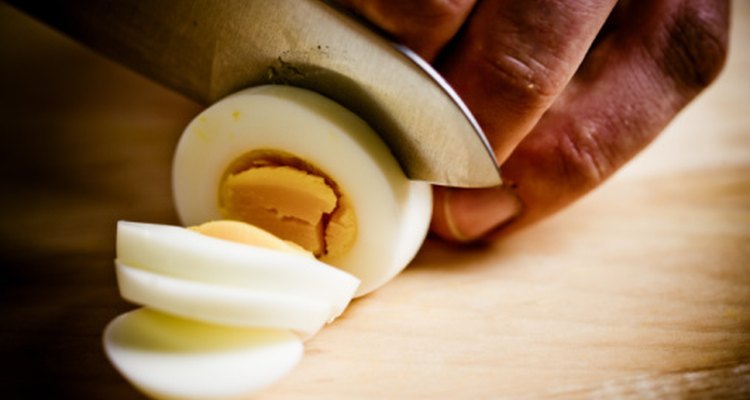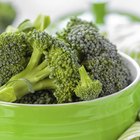
The egg consists of two distinct parts; the white and the yolk. The yolk serves as the source of nutrition for the developing embryo and contains 4.5 g of total fat with 1.6 g of saturated fat and 184 mg of dietary cholesterol. The egg white contains the majority of the protein in the egg along with essential minerals including potassium.
Potassium Content
Eggs are one of nature’s most perfect foods. In addition to containing one of the most nutritionally available proteins, eggs contain 13 essential nutrients. The yolk contains most of the essential vitamins, but the egg white contains the majority of two essential minerals; sodium and potassium. The Egg Nutrition Center reports that one large egg provides 71 mg of sodium and 69 mg of potassium. The egg white contains 55 mg of sodium and 54 mg of potassium while the yolk contains 8 mg of sodium and 19 mg of potassium.
Recommended Intake
Potassium is vital for all living cells, tissues and organs to function properly. The Institute of Medicine sets the adequate intake, the amount necessary to meet the needs of the body, for potassium at 4,700 mg per day. Despite the important role potassium plays in maintaining a healthy blood pressure, few adults in the United States meet this daily recommended intake. Eating egg whites can help you meet your daily recommended potassium intake.
Potassium Role
Potassium, like sodium, functions as an electrolyte within your body. Potassium transmits tiny electrical impulses generated by nerves, making it vital to normal muscle function and to maintaining a rhythmic heartbeat. Potassium also helps to keep the amount of fluid inside of cells and surrounding cells balanced. The impact potassium makes on fluid levels helps to blunt the effects of excessive sodium, which plays a vital role in maintaining a healthy blood pressure. Because egg whites contain very little fat, no saturated fat and no cholesterol, they make a good source of protein for a heart-healthy diet.
Potassium and Sodium
The majority of potassium absorbed from dietary sources enters the cells, while the majority of sodium remains in the fluid surrounding the cells. The balance of these two minerals creates an electrochemical gradient known as a membrane potential. Your body expends approximately 20 to 40 percent of its resting energy in maintaining this membrane potential created by sodium and potassium. Eating egg whites helps your body balance these two minerals because they contain nearly equal amounts of sodium and potassium.
Related Articles

The Nutritional Value of Norwegian ...

Choline in Eggs

Elastin Supplements

What Is the Nutrition for Cranberry ...

Muenster Cheese Health Benefits

Nutrition Information on Blueberries

Copper Peptides Side Effects

Tips to Grow Pubic Hair

The Nutritional Value of Edamame Beans

Zinc & Copper for Aging Skin

Vitamin B2 for Hair Growth

What Vitamins Help the Liver?

Do Eggs Make Baked Goods Rise?

Foods Rich in Magnesium & Phosphorus

The Carbohydrates in Blueberries

Protein & Carbohydrates in Breakfast

How Exercise Increases Hair Growth

L-Lysine for Hair Growth

Swimming Pool Algae Problems

What Are the Benefits of Great Northern ...
References
Writer Bio
Stephanie Chandler is a freelance writer whose master's degree in biomedical science and over 15 years experience in the scientific and pharmaceutical professions provide her with the knowledge to contribute to health topics. Chandler has been writing for corporations and small businesses since 1991. In addition to writing scientific papers and procedures, her articles are published on Overstock.com and other websites.
Photo Credits
Jupiterimages/Photos.com/Getty Images